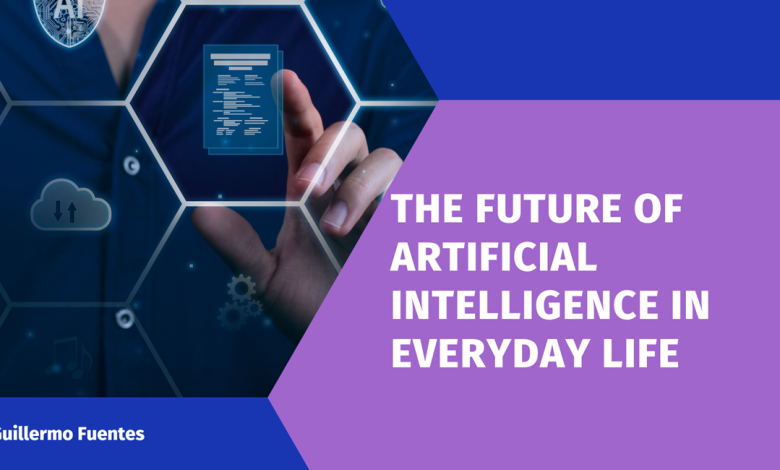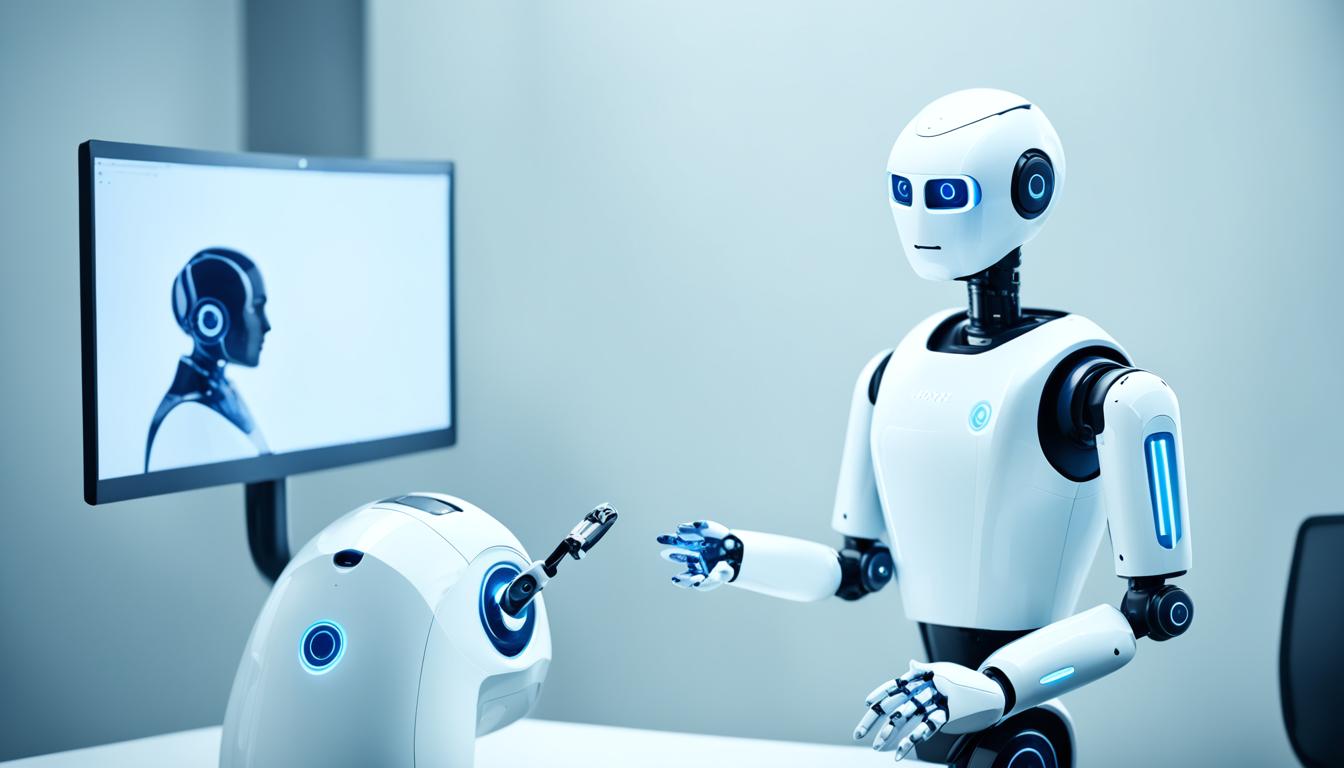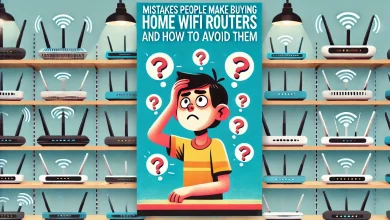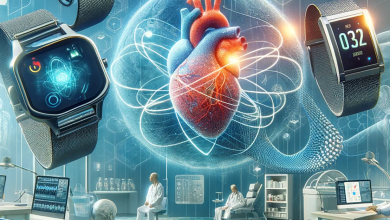The Future of AI in Everyday Life

The Future of AI in Everyday Life
Artificial Intelligence (AI) has already transformed our world in countless ways. As it grows, its impact on daily life will become even more profound. AI will make life easier, safer, and more efficient. In this article, we’ll explore the future of AI and how it will continue to shape our lives.
What is AI?
AI, or Artificial Intelligence, is the ability of machines to mimic human intelligence. This includes learning, reasoning, and problem-solving. AI systems use data to make decisions, often more accurately than humans. In recent years, advancements in AI have brought us closer to a future where machines can think, act, and learn independently.
AI in Our Homes
AI is already a part of our homes, and its role is set to expand. Currently, smart devices like Alexa, Google Home, and Siri help with tasks such as setting reminders, playing music, and answering questions. However, the future of AI in homes will go far beyond these functions.
Soon, smart homes will become even “smarter.” Imagine a home that learns your habits, adjusts lighting based on your mood, or controls room temperature automatically. AI will make it possible. For instance, AI-powered refrigerators will suggest recipes based on the items inside. They will even notify you when supplies are low and place orders online.
Moreover, AI will enhance security in homes. Intelligent cameras will detect unusual activity and send alerts immediately. Doors will unlock with facial recognition, adding an extra layer of safety. In the future, AI will make homes more personalized, efficient, and secure.
AI in Healthcare
Healthcare is one of the fields where AI has the potential to save lives. With advancements in AI, healthcare will become more precise and accessible. AI-powered tools can already analyze medical images, helping doctors detect diseases faster and more accurately.
In the near future, AI will play a significant role in diagnosing illnesses at early stages. Wearable devices, such as smartwatches, can monitor heart rates, blood pressure, and other vital signs. These devices, equipped with AI, will detect anomalies and alert users and their doctors. Early detection will prevent severe health issues, improving patient outcomes.
Additionally, AI will assist in drug discovery. Creating new medicines takes time and money, but AI algorithms can identify potential treatments faster. They can analyze thousands of compounds, finding the most promising ones for further testing. As a result, patients will have quicker access to new medications.
In rural areas, AI can bridge healthcare gaps. Virtual doctors, powered by AI, will offer consultations to people without access to medical professionals. This will bring healthcare to remote and underserved areas, saving countless lives.
AI in Education
Education will be another area transformed by AI. Personalized learning, a growing trend, will reach new heights with AI. Currently, online platforms like Khan Academy and Duolingo use AI to adapt lessons based on a student’s pace. In the future, AI will create more customized learning experiences.
Imagine a classroom where each student learns at their ideal pace. AI systems will monitor students’ progress and adjust lessons accordingly. Struggling students will receive extra support, while advanced learners can move ahead. This personalized approach will make learning more engaging and effective.
Furthermore, AI will assist teachers by handling repetitive tasks. Grading, for example, is time-consuming. AI can evaluate assignments quickly, giving teachers more time to focus on students. Additionally, AI will help identify areas where students need extra help, allowing teachers to provide targeted support.
Language barriers will also be minimized with AI. Real-time translation tools will allow students from different backgrounds to learn together. This will create a more inclusive learning environment, promoting diversity in education.
AI in Transportation
The future of transportation is closely linked with AI. Self-driving cars are one of the most anticipated developments in this field. These vehicles, powered by AI, will make travel safer and more convenient. Companies like Tesla are already testing autonomous cars, and they will become common on roads soon.
With AI-driven cars, traffic accidents due to human error will decrease. AI can process information faster than a human, reacting instantly to obstacles or changes in road conditions. This will lead to safer roads and fewer fatalities.
Public transportation will also benefit from AI. Smart buses and trains will adjust routes based on real-time data, reducing wait times and making commutes smoother. AI can also predict peak hours, allowing cities to optimize transportation schedules.
In addition, drones, powered by AI, will handle small deliveries. These drones will deliver packages faster and more efficiently, transforming the logistics industry. With drones, same-day delivery will become the norm, making online shopping even more appealing.

AI in the Workplace
The workplace of the future will be heavily influenced by AI. Many tasks that are repetitive or data-heavy can be automated, saving time and reducing errors. For example, AI can handle data entry, customer service, and scheduling, allowing employees to focus on more complex tasks.
AI will also help in decision-making. Using data analysis, AI can provide insights that guide business strategies. For instance, AI can identify market trends, helping companies adapt quickly. This will make businesses more responsive and competitive.
Additionally, AI will play a role in hiring. Algorithms will analyze resumes, looking for the best candidates. AI can even assess personality traits, helping employers find the right fit for their teams. While some fear AI will take jobs, it will also create new roles, especially in tech-related fields.
Remote work, which gained popularity during the COVID-19 pandemic, will be further enhanced by AI. Virtual meetings, powered by AI, will include features like real-time transcription and language translation. This will make remote work more efficient and inclusive, allowing teams from around the world to collaborate seamlessly.
Ethical and Privacy Concerns
As AI integrates into daily life, ethical and privacy concerns will arise. AI systems often collect and analyze vast amounts of personal data. This raises questions about data security and privacy. For example, AI-powered cameras in smart homes may feel intrusive. Ensuring that AI respects user privacy will be crucial.
Moreover, AI decisions can sometimes be biased. If an AI system is trained on biased data, it may produce unfair outcomes. This can be problematic, especially in fields like hiring and law enforcement. Developers must work to create transparent, unbiased AI systems.
Lastly, there is the concern of AI surpassing human control. While this is a distant possibility, some experts warn about creating AI that is too autonomous. Establishing ethical guidelines and regulations will be essential to keep AI safe and beneficial.
The Road Ahead
The future of AI in everyday life is exciting yet challenging. AI will continue to enhance convenience, safety, and efficiency across various fields. However, careful consideration of ethics and privacy will be necessary.
In the coming years, AI will become a trusted assistant in our homes, schools, and workplaces. It will help doctors save lives, teachers educate more effectively, and businesses make better decisions. Embracing AI responsibly will allow society to reap its benefits while minimizing risks.
The journey of AI has only just begun. As it continues to evolve, AI will reshape our world in ways we can only imagine. The future is bright, and AI will play a key role in making it even brighter.





